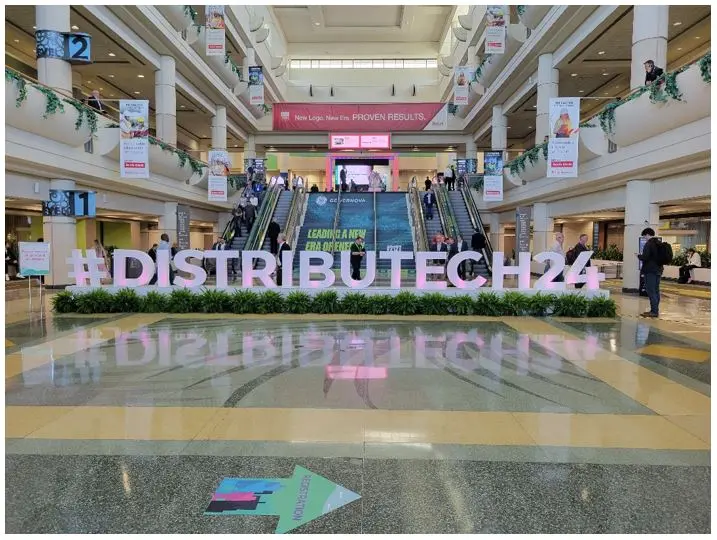

Keywords: DistribuTECH International, Sustainability, Energy Ecosystem, Energy Sector, Smart Grid, Decentralization, Innovation, Eco-friendly, Digitalization, ARC Advisory Group.
The electricity sector stands at the crossroads of innovation and sustainability, driven by the urgent need to adapt to changing environmental realities and evolving technological landscapes. As highlighted at the recent DistribuTECH International show in Orlando, the industry is embracing a series of transformative trends that promise to redefine how energy is generated, distributed, and consumed. These represent a fundamental shift toward a more resilient, efficient, and sustainable energy ecosystem.
The adoption of advanced grid infrastructure, the integration of eco-friendly solutions, the leveraging of digital technologies, and the move toward decentralization and consumer empowerment are at the forefront of this transformation. Each of these areas reflects a response to both the challenges and opportunities. These themes are interlinked, each influencing and enhancing the others in a complex confluence of progress and innovation. The journey toward realizing these ambitions has challenges, including technological hurdles, regulatory barriers, and the need for significant investment. However, the potential rewards are substantial, offering the promise of a future where energy is cleaner, more accessible, and more aligned with the needs of both people and the planet.
In February, DistribuTECH International provided a window into the future of energy, highlighting the strategies, technologies, and ideas that are set to shape the coming decades. As we consider these themes, it is evident that the path forward requires collaboration, innovation, and a commitment to sustainability.
Modernization of the grid and the transformation of infrastructure are both essential to the future of electricity. This involves the integration of smart grid technologies that enhance the efficiency and reliability of energy distribution, supporting the increasing renewable energy sources. Microgrids play a critical role in this transformation, providing resilient and sustainable energy solutions that can operate independently of the traditional grid. These advancements are about enhancing current capabilities as well as future-proofing the energy infrastructure against the demands of tomorrow. They represent significant investments in both the sustainability and resilience of the electricity sector, facilitating a more adaptive and responsive grid.

This approach underscores the necessity of embracing innovation to tackle the challenges of energy distribution in an era marked by climate change and technological advancement. The goal is to build an infrastructure that is not only more efficient and reliable but also capable of supporting the transition to a low-carbon future.
The push toward sustainability and the adoption of eco-friendly solutions are becoming increasingly central to the energy sector's operations and strategy. This theme encompasses a broad spectrum of initiatives, from the deployment of renewable energy technologies to the integration of sustainable practices across the value chain. The industry's focus on reducing its environmental footprint is evident in the development of green infrastructure and the exploration of carbon capture and storage technologies. These efforts are critical in the fight against climate change, aiming to minimize the impact of energy production and consumption on the planet. The commitment to sustainability is driving innovation, as companies seek to harness wind, solar, and other renewable sources more effectively and efficiently.
The digitalization of the energy sector and the adoption of smart grid technologies are revolutionizing how energy is managed and consumed. Through advanced metering infrastructure, IoT devices, and AI, utilities can now monitor and control the grid with precision, improving efficiency and reliability. These technologies enable real-time analysis and decision-making, facilitating the integration of renewable energy sources and enhancing demand response capabilities.
Smart grids are not just about technological upgrades; they represent a shift toward a more interactive and consumer-centric energy system, where users can actively participate in energy management. This digital transformation is also critical for addressing the challenges of an increasingly complex and decentralized energy landscape, providing the tools needed to manage multiple energy sources and storage options seamlessly. Cybersecurity emerges as a paramount concern, as the reliance on digital technologies increases the grid's vulnerability to attacks.
The move toward digitalization and smart technologies demonstrates the sector's commitment to leveraging innovation to meet the challenges of the 21st century, offering a pathway to a more efficient, resilient, and consumer-friendly energy ecosystem. As these technologies continue to evolve, they promise to unlock new possibilities for optimizing energy usage and enhancing grid management.
The themes highlighted at DistribuTECH International represent the multifaceted approach the energy sector is taking to navigate its future. The industry's focus on grid modernization, sustainability, digitalization, and decentralization reflects a deep understanding of the challenges and opportunities that lie ahead.
However, the rewards of this transformation are clear: a future where energy is cleaner, more accessible, and more attuned to the needs of both people and the planet. As the sector continues to evolve, the insights and innovations emerging from DistribuTECH International will serve as critical guideposts, helping to steer the industry toward its ambitious goals.
ARC Advisory Group clients can view the complete report at the ARC Client Portal.
Please Contact Us if you would like to speak with the author.
Obtain more ARC In-depth Research at Market Analysis

